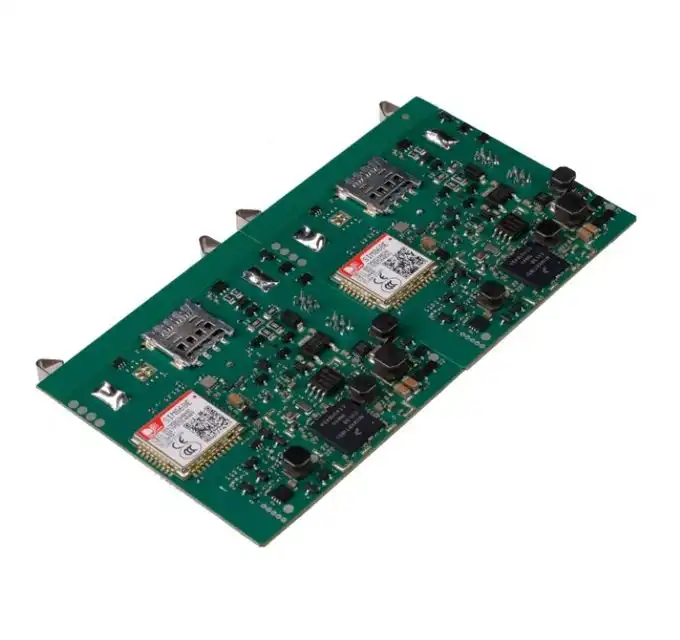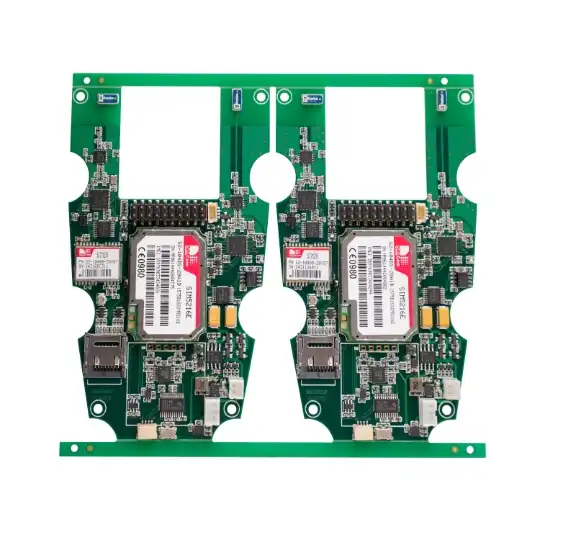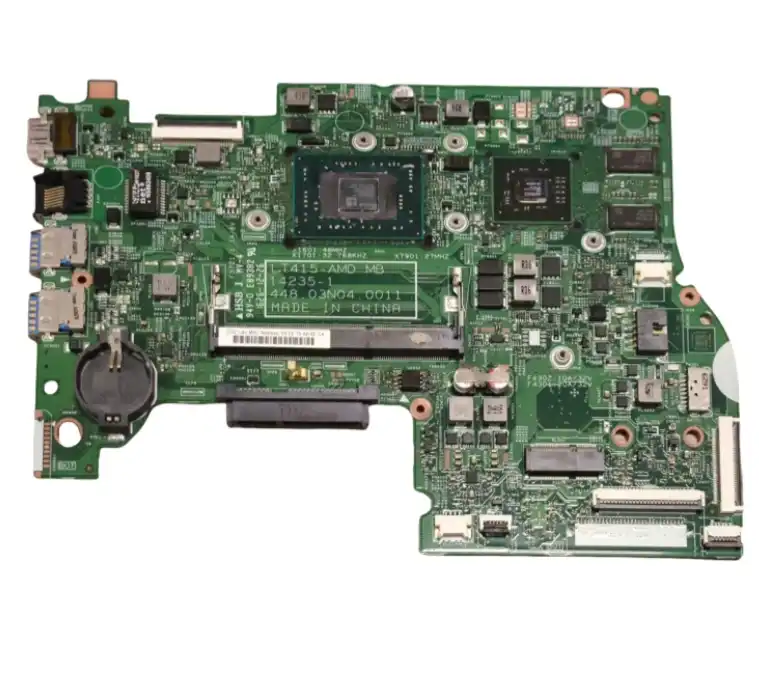Understanding Heavy Copper PCB Technology and Its Applications
What Defines Heavy Copper PCBs?
Heavy copper PCBs are distinguished by their thicker copper layers, typically ranging from 3 oz (105 μm) to 20 oz (700 μm) or more. This substantial increase in copper thickness, compared to standard PCBs with 1 oz to 2 oz copper, is the hallmark of heavy copper technology. The manufacturing process for these specialized boards requires advanced techniques and expertise, which is why choosing a reputable heavy copper PCB manufacturer is crucial.
The increased copper thickness in these PCBs isn't just about bulk; it's about enhancing the board's electrical and thermal properties. This thickness allows for higher current-carrying capacity, improved heat dissipation, and greater mechanical strength. These characteristics make heavy copper PCBs ideal for applications where standard PCBs would fail under high current loads or extreme temperatures.
Key Applications of Heavy Copper PCBs
Heavy copper PCBs find their niche in a variety of high-power and high-reliability applications. Some key areas include:
- Power Electronics: In power supplies, inverters, and motor controllers, heavy copper PCBs excel at handling high currents and dissipating heat effectively.
- Automotive Industry: Electric vehicle systems, particularly in power distribution and battery management, benefit from the robustness of heavy copper PCBs.
- Industrial Equipment: Heavy machinery and industrial control systems rely on heavy copper PCBs for their durability and ability to withstand harsh environments.
- Aerospace and Defense: The high reliability and performance of heavy copper PCBs make them suitable for critical aerospace and defense applications.
- Renewable Energy: Solar inverters and wind turbine control systems utilize heavy copper PCBs for their high power handling capabilities.
The versatility of heavy copper PCBs extends beyond these applications. Any electronic system that demands high current capacity, superior thermal management, or enhanced durability can benefit from heavy copper technology. This is why partnering with an experienced heavy copper PCB manufacturer is essential for businesses looking to leverage these advantages in their products.
Benefits and Challenges of Heavy Copper PCB Manufacturing
Advantages of Heavy Copper PCBs
Heavy copper PCBs offer a multitude of benefits that make them indispensable in certain applications. Understanding these advantages helps explain why many industries are turning to specialized heavy copper PCB manufacturers for their high-performance circuit board needs:
- Enhanced Current-Carrying Capacity: The thicker copper layers allow for significantly higher current flow without overheating, making them ideal for power-intensive applications.
- Improved Thermal Management: Heavy copper PCBs dissipate heat more effectively, reducing the risk of thermal damage and improving overall system reliability.
- Increased Durability: The robust nature of heavy copper traces makes these PCBs more resistant to mechanical stress and vibration, enhancing their longevity in harsh environments.
- Reduced Board Complexity: In some cases, heavy copper PCBs can eliminate the need for additional heat sinks or cooling systems, simplifying board design and reducing overall system costs.
- Enhanced Plated Through-Hole (PTH) Reliability: The thicker copper allows for more robust plated through-holes, improving the reliability of interconnects in multi-layer boards.
These advantages make heavy copper PCBs a superior choice for applications where standard PCBs would be inadequate, justifying the specialized manufacturing process required to produce them.
Challenges in Heavy Copper PCB Manufacturing
While the benefits of heavy copper PCBs are substantial, their manufacturing process presents unique challenges that require expertise and advanced technology to overcome:
- Etching Precision: Achieving precise etching on thicker copper layers is more challenging and requires specialized equipment and techniques.
- Thermal Management During Production: The increased copper mass requires careful thermal management during the manufacturing process to ensure proper bonding and prevent warping.
- Drilling and Plating: Creating reliable vias and plated through-holes in heavy copper boards requires advanced drilling and plating techniques.
- Material Compatibility: Ensuring proper adhesion between the heavy copper layers and the substrate material is crucial for the board's integrity.
- Cost Considerations: The specialized processes and materials required for heavy copper PCB manufacturing can increase production costs compared to standard PCBs.
Overcoming these challenges requires a heavy copper PCB manufacturer with extensive experience, state-of-the-art equipment, and rigorous quality control processes. This expertise ensures that the final product meets the high standards required for critical applications.
Selecting the Right Heavy Copper PCB Manufacturer
Key Factors to Consider
Choosing the right heavy copper PCB manufacturer is crucial for ensuring the quality, reliability, and performance of your electronic products. Here are essential factors to consider:
- Manufacturing Capabilities: Ensure the manufacturer has the necessary equipment and expertise to handle heavy copper PCB production, including advanced etching systems and precision drilling capabilities.
- Quality Control Processes: Look for manufacturers with robust quality assurance measures, including electrical testing, thermal cycling tests, and adherence to industry standards like IPC-6012.
- Experience and Track Record: Choose a manufacturer with a proven history of producing high-quality heavy copper PCBs for industries similar to yours.
- Design Support: A manufacturer offering design for manufacturability (DFM) services can help optimize your PCB design for heavy copper production, potentially saving time and costs.
- Certifications: Verify that the manufacturer holds relevant industry certifications, such as ISO 9001, which indicate adherence to quality management standards.
The Importance of a Reliable Manufacturing Partner
Partnering with a reliable heavy copper PCB manufacturer goes beyond just production. It can significantly impact your product's success and your company's reputation. A good manufacturer will:
- Provide consistent quality, reducing the risk of field failures and product recalls.
- Offer technical support and design optimization, potentially improving your product's performance and reducing costs.
- Ensure timely delivery, helping you meet your market deadlines and maintain customer satisfaction.
- Adapt to your specific requirements, offering customized solutions for unique applications.
- Stay updated with the latest technologies and industry trends, keeping your products competitive in the market.
By carefully selecting a heavy copper PCB manufacturer that excels in these areas, you can ensure that your high-performance electronic products are built on a solid foundation of quality and reliability.
Conclusion
Heavy copper PCBs represent a significant advancement in printed circuit board technology, offering unparalleled performance in high-power and high-reliability applications. The advantages of enhanced current-carrying capacity, superior thermal management, and increased durability make them indispensable in industries ranging from automotive to aerospace. However, the specialized nature of heavy copper PCB manufacturing underscores the importance of choosing the right manufacturer.
When selecting a heavy copper PCB supplier or manufacturer, it's crucial to consider factors such as manufacturing capabilities, quality control processes, and industry experience. A reliable heavy copper PCB manufacturer not only produces high-quality boards but also provides valuable design support and ensures timely delivery. This partnership can significantly impact the success of your electronic products in the market.
As technology continues to advance and the demand for high-performance electronic systems grows, the role of heavy copper PCBs is likely to expand. By understanding the benefits and challenges associated with these specialized PCBs and partnering with a reputable manufacturer, businesses can leverage this technology to create more robust, efficient, and innovative electronic products.
FAQ
What is the minimum copper thickness for a PCB to be considered "heavy copper"?
Generally, PCBs with copper thicknesses of 3 oz (105 μm) or greater are considered heavy copper. However, some manufacturers may have different thresholds.
Can heavy copper PCBs be used in combination with standard copper layers?
Yes, it's possible to create hybrid PCBs that combine heavy copper layers with standard copper layers, offering a balance of performance and cost-effectiveness.
How does the cost of heavy copper PCBs compare to standard PCBs?
Heavy copper PCBs typically cost more than standard PCBs due to the specialized manufacturing processes and materials required. However, they can be more cost-effective in the long run for high-power applications.
Experience the Power of Heavy Copper PCBs with Ring PCB | Ring PCB
At Ring PCB, we specialize in manufacturing high-quality heavy copper PCBs tailored to your specific needs. Our state-of-the-art facility and expert team ensure precision, reliability, and performance in every board we produce. From design optimization to rigorous quality control, we offer comprehensive solutions for your heavy copper PCB requirements. Experience the Ring PCB difference in heavy copper technology. Contact us at [email protected] to discuss your project and elevate your electronic designs to new heights.
References
1. Johnson, R. (2022). "Advanced Techniques in Heavy Copper PCB Manufacturing". Journal of Electronics Manufacturing, 15(3), 78-92.
2. Smith, A. & Brown, B. (2021). "Thermal Management Solutions in Heavy Copper PCBs for Automotive Applications". International Conference on Automotive Electronics, pp. 234-249.
3. Lee, C. et al. (2023). "Comparative Analysis of Current-Carrying Capacity in Standard vs. Heavy Copper PCBs". IEEE Transactions on Components, Packaging and Manufacturing Technology, 11(2), 312-325.
4. Thompson, D. (2020). "Design Considerations for Heavy Copper PCBs in Industrial Control Systems". Industrial Electronics Handbook, 5th Edition, CRC Press.
5. Garcia, M. & Patel, K. (2022). "Quality Assurance Processes in Heavy Copper PCB Manufacturing: A Case Study". Quality Engineering in Electronics Manufacturing, 9(4), 156-170.






